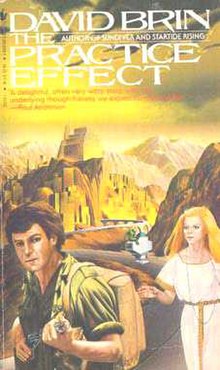The Practice Effect: Difference between revisions
Fixed grammar Tags: canned edit summary Mobile edit Mobile app edit |
Update Infobox book template image parameter to bare filename per template documentation, removed stub tag using AWB |
||
| Line 3: | Line 3: | ||
| title_orig = The Practice Effect |
| title_orig = The Practice Effect |
||
| translator = |
| translator = |
||
| image = |
| image = Practiceeffect.jpg |
||
| caption = First edition cover |
| caption = First edition cover |
||
| author = David Brin |
| author = David Brin |
||
| illustrator = |
| illustrator = |
||
| Line 70: | Line 70: | ||
[[Category:Novels by David Brin]] |
[[Category:Novels by David Brin]] |
||
[[Category:American science fiction novels]] |
[[Category:American science fiction novels]] |
||
{{1980s-sf-novel-stub}} |
|||
Revision as of 21:40, 29 November 2015
 First edition cover | |
| Author | David Brin |
|---|---|
| Original title | The Practice Effect |
| Cover artist | Peter Goodfellow |
| Language | English |
| Genre | Science Fiction |
| Publisher | Bantam Books |
Publication date | 1984 |
| Media type | |
| ISBN | 978-0-553-23992-8 |
| OCLC | 10574112 |
The Practice Effect is a novel by David Brin, written in 1984.
Plot summary
A scientist by the name of Dennis Nuel is working at, and attending, an institute of scientific research and pioneering work into the fictional scientific field of "Zievatronics", the manipulation of Time and Space. After the death of his mentor, however, he is taken off the project and another professor takes over.
After a time, the device that has been created to move through space and time, known as the "Zievatron" encounters operational problems and is fixed to the co-ordinates of a world that appears to be very similar to our Earth in most respects, and Dennis is re-recruited to help fix it. He volunteers to be sent to the other world in order to fix the other part of the Zievatron. On arriving to this planet, he finds the Zievatron dismantled and critical parts of it missing. Of the three surveillance robots sent through to this planet, he finds two have also been broken apart. After a while, he finds the last robot, intact and still functioning, and uses it to view any recorded images that might help him identify what it was that happened to the Zievatron.
In this world, instead of objects wearing out as you use them, they improve. This is referred to as the Practice effect. For example, swords get sharper with use, baskets get stronger the more things they carry, mirrors, furniture and decorations look more attractive the more they are looked at. The downside to this being that an object's condition deteriorates over time if not put to use. Under this system, members of society's higher strata employ servants to Practice their own possessions to perfection.
It is eventually discovered that the Practice Effect is the result of an elusive, biologically-engineered creature known as a Krenegee Beast that causes a change in a law of thermodynamics. This creature emits a field under which the Practice Effect works. The closer one is to the Krenegee Beasts, the more efficient the Practice that is done. The Practice Effect can take many months before an object reaches its maximum point of "practice", but the process is sped up if one is under a Felthesh Trance. The presence of a Krenegee Beast speeds up the process more than a Felthesh Trance.
Table of Contents
The chapter titles are all jokes, some puns, most in Latin with one (ch. 6) in French. The translations are included.
1. Sooee generis - (like "Sui Generis", but with the pig-caller's noise)
2. Cogito, ergo tutti fruitti - I think, therefore tutti fruitti
3. Nom de Terre - Name of the land (like "Pomme de Terre", potato, or "Nom de Guerre", war name)
4. The best way to Cornegie Hall
5. Transom dental - Remove dental (like "transcendental")
6. Ballon d'essai - trial balloon
7. Pundit Nero - Pandit Nehru, first Prime Minister of India.
8. “Eurekaarrgh”
9. Discus jestus - majesty Disc
10. Sic biscuitus disintegratum - This is how the cookie crumbles
11. Et two toots - and two Toots
12. Semper ubi sub ubi - Always where under where ("Always wear underwear")
Reception
Algis Budrys found the novel's premise appealing, praising Brin's "really first-rate SFnal idea," but its execution disappointing, leaving little of interest but plot details once the central mystery was explained at the novel's midpoint, "and as a plotsmith Brin is just another guy."[1]
